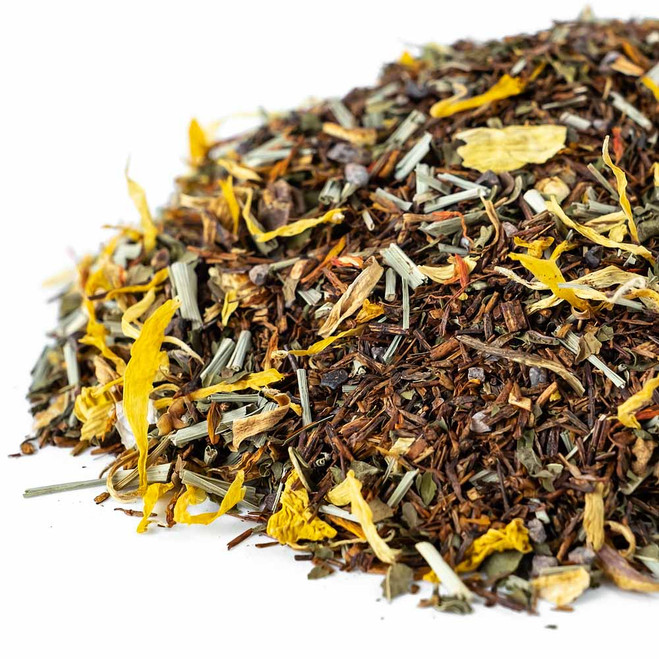-

-

-

-

-

-

-

-

-

Honeybush Tea - Loose
£30.28 -

Marzipan Rooibos Tea - Loose
£30.61 -

-

What is Rooibos and where does it come from?
What is Rooibos and where does it come from?
The scientific name for Rooibos is Aspalathus linearis. It grows naturally in the Cederberg region of South Africa, especially near the town of Clanwilliam. This area was the first place Rooibos was grown for commercial purposes. Benjamin Ginsberg, often called the "father of the Rooibos tea industry," was among the first to see its commercial potential.
Commercial farming of Rooibos in Clanwilliam began to expand after Olof Bergh and other local farmers improved cultivation methods. These improvements were significant, especially after World War II when the Rooibos market crashed. In 1948, farmers formed the Clanwilliam Tea Cooperative to keep production and sales stable and under control. Exports of Rooibos tea from South Africa have grown from less than 500 tonnes in 1996 to almost 9,000 metric tonnes in recent years, showing a huge rise in market demand worldwide.
We named our grade A Rooibos Clanwilliam Rooibos Tea after the historic town of Clanwilliam.
What are the reported health benefits?
Rooibos is prized for its health benefits. New studies and articles show that Rooibos is good for your health in the following ways:
- Antioxidant Properties: Scientific research confirms Rooibos is rich in natural antioxidants, which include aspalathin and nothofagin. These antioxidants help protect cells against oxidative stress and might reduce the risk of diseases such as cancer. (Marnewick JL, 2009 [Chemical & Biological Interactions])
- Heart Health: Studies suggest that Rooibos tea can indeed impact cardiovascular health by reducing oxidative stress and improving cholesterol levels (Persson IA, 2010 [Journal of Ethnopharmacology]). However, evidence directly linking Rooibos to lowered blood pressure is less conclusive.
- Managing Diabetes: Research has shown that aspalathin in Rooibos tea might exert anti-diabetic effects (Son MJ, 2013 [Phytomedicine]). Aspalathin has been noted for its potential to improve glucose homeostasis in type 2 diabetes models.
- Bone Health: While specific research directly linking Rooibos to improved bone health is limited, its high mineral content and antioxidants could hypothetically contribute to better bone structure and health. More specific studies are needed to confirm this link.
- Skin Care: The anti-inflammatory properties of Rooibos may help with skin conditions such as eczema or acne (Sasaki Y, 2015 [European Journal of Nutrition]). Zinc and alpha-hydroxy acids found in rooibos might also contribute to its potential skin health benefits.
- Weight Loss: Rooibos tea is sometimes associated with promoting weight loss due to its low-calorie content and potential effects on fat metabolism. (Rawan Nehme, Aspalathus linearis (Rooibos) Targets Adipocytes and Obesity-Associated Inflammation, 2023 Nutrients)
- Sleep Improvement: The lack of caffeine makes it an excellent choice for improving sleep. Drinking Rooibos before bed can help to induce a more comfortable sleep due to its calming properties.
Is Red Bush Tea the same as Rooibos?
You may well have heard the term 'Red Bush Tea.'. In English, the word "red bush" comes straight from the Afrikaans word "rooibos," which describes the deep red colour of this herbal tea, which makes the drink stand out. Red bush tea is another name used for Rooibos. With the infused red colour and sweet taste, with hints of caramel and vanilla, it's often drunk instead of regular tea because it doesn't contain caffeine.
What are popular Rooibos blends?
Rooibos is a perfect base tea for making herbal tea blends. Combining Rooibos with other herbs can create healthy, delicious, full-bodied drinks. Below are some of our most popular rooibos blends:
- Almond Cherry Rooibos (nut-free) is mellow with a delicious almond and cherry character. We've used natural almond and cherry flavours and decorated with mallow flowers to give the drink a rich marzipan taste.
- Mint Chocolate Rooibos - mint and fruity rooibos flavour with a refreshing finish. We've combined peppermint leaves and cocoa pieces with Rooibos for this guilt-free chocolate delight. The result is a refreshing, comforting, healthy, caffeine-free drink.
How to brew Rooibos Tea
- Boil freshly drawn water (filtered if possible)
- Use 1 x measuring spoonful of loose Rooibos or one tea bag per 250ml cup.
- Place the loose Rooibos into a cup with your preferred tea infuser, such as a Jenier Paper T-filter or pyramid tea bag.
- Pour the freshly boiled water over the Rooibos.
- Leave to brew for at least 6 minutes to unlock the flavours.
- Once brewed to your preferred strength, remove the leaves. As Rooibos contains no caffeine, the leaves can remain in the water, and your tea will not become bitter.
